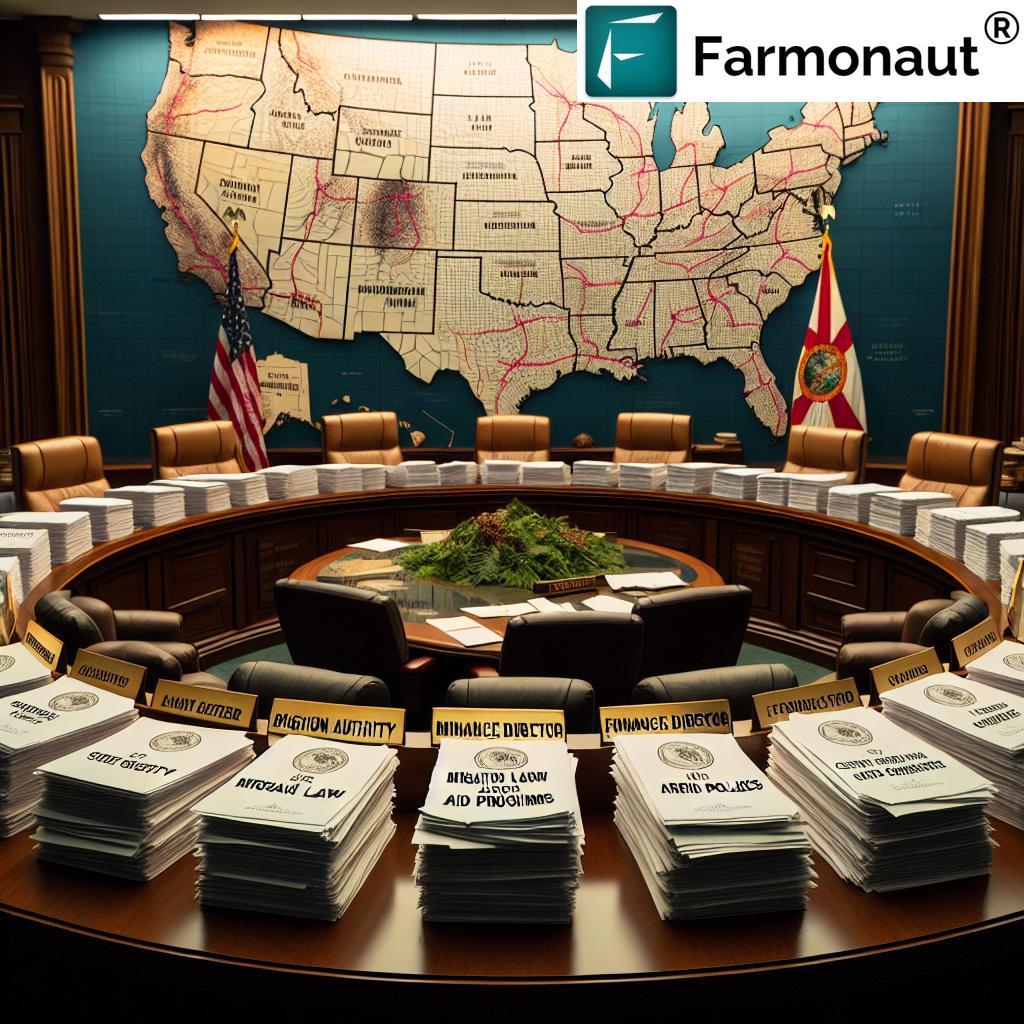Florida’s Landmark Immigration Enforcement Shift: New State Board and Legislative Compromise Reshape Policy
In a pivotal moment for Florida’s immigration enforcement landscape, we are witnessing a significant transformation that will reshape the state’s approach to this complex issue. As SEO and agricultural technology experts at Farmonaut, we recognize the importance of staying informed about legislative changes that can impact various sectors, including agriculture. Today, we’ll delve into the recent developments in Florida’s immigration policy and explore their potential implications.
“Florida’s new State Board of Immigration Enforcement will involve multiple cabinet members, decentralizing power in immigration policy.”

The Compromise: A New Era in Florida Immigration Enforcement
On a crucial night in Tallahassee, Florida Governor Ron DeSantis and Republican legislative leaders reached a landmark compromise on illegal immigration enforcement. This agreement effectively resolved a tense two-week standoff and ushered in a new era for the state’s approach to this contentious issue.
At the heart of this compromise is the creation of a new State Board of Immigration Enforcement. This board will consist of key cabinet members, including:
- The Governor
- Attorney General
- Chief Financial Officer
- Agriculture Commissioner
This shared power structure marks a significant departure from the previous bill, which had aimed to strip Governor DeSantis of certain immigration enforcement powers. Instead of empowering Agriculture Commissioner Wilton Simpson as the sole head of immigration enforcement, the new board will distribute responsibilities among these high-ranking state officials.
Key Changes in Florida Immigration Policy
Let’s break down the major shifts in Florida’s immigration enforcement landscape:
- Migrant Transportation: The new legislation will eliminate the governor’s control over migrant transport operations. These operations will now only be permitted under federal government direction, with state costs reimbursed.
- Local Law Enforcement Grants: The board will oversee $250 million in grants for local police departments. These funds aim to enhance cooperation between local law enforcement and federal immigration officials.
- State-Level Immigration Crimes: The special legislative session will consider bills introducing state-level charges for immigrants who illegally enter or reenter Florida.
- Detention Protocols: New legislation will focus on improving detention protocols, with an emphasis on denying bail to individuals arrested for illegal immigration immediately upon arrest.
The Political Landscape: Tensions and Resolutions
The path to this compromise was not without its challenges. Tensions between Governor DeSantis and GOP lawmakers had escalated when the legislature initially rebuffed his push for a more stringent immigration agenda. This led to a series of events:
- DeSantis convened a special session to advance his vision on immigration enforcement.
- Lawmakers enacted legislation favoring Agriculture Commissioner Simpson, perceived as a challenge to DeSantis.
- The governor launched a vigorous media campaign criticizing legislators who opposed him.
Despite these tensions, the newly reached agreement demonstrates the power of compromise in shaping effective policy. It’s a reminder that even in polarized political environments, collaboration can lead to meaningful change.
Implications for Agriculture and Rural Communities
As experts in agricultural technology, we at Farmonaut understand the intricate relationship between immigration policy and the agricultural sector. Many farms and rural communities rely heavily on immigrant labor, making these policy changes particularly significant for the industry.
Under the new agreement, Agriculture Commissioner Wilton Simpson will receive approximately $46 million to hire 84 additional law enforcement personnel. This move aims to boost immigration enforcement efforts along critical zones, such as Interstate 10 in the Florida Panhandle, through the establishment of a new “interdiction station.”
While this increased enforcement may pose challenges for some agricultural operations, it also presents an opportunity for farms to leverage technology to optimize their operations. Farmonaut’s satellite-based farm management solutions can help farmers increase efficiency and productivity, potentially mitigating some of the impacts of changing labor dynamics.
A Comparative Look at Florida’s Immigration Enforcement Policy Changes
| Policy Area | Previous Approach | New Approach |
|---|---|---|
| Enforcement Authority | Centralized under the Governor | Shared among State Board of Immigration Enforcement members |
| State-Level Immigration Crimes | Limited state-level charges | Introduction of new state-level charges for illegal entry/reentry |
| Detention Protocols | Standard bail procedures | Immediate denial of bail for illegal immigration arrests |
| Local Police Cooperation | Limited formal cooperation structure | $250 million in grants to enhance cooperation with federal officials |
| Migrant Transportation | State-controlled operations | Limited to federal direction with state cost reimbursement |
“The special legislative session in Florida will consider bills introducing state-level immigration crimes, potentially creating new legal categories.”
The Role of Technology in Adapting to Policy Changes
As the agricultural landscape evolves in response to these policy shifts, technology will play a crucial role in helping farmers adapt. Farmonaut’s suite of tools can assist in several ways:
- Satellite-Based Crop Health Monitoring: Our advanced technology allows farmers to monitor crop health remotely, reducing the need for manual field inspections.
- AI-Driven Advisory Systems: Our Jeevn AI system provides personalized farm management advice, helping farmers optimize their operations with potentially reduced labor.
- Resource Management Tools: Our platform offers solutions for efficient resource allocation, crucial in times of changing labor dynamics.
Explore our API Developer Docs to learn more about integrating these solutions into your agricultural operations.
National Implications of Florida’s Policy Shift
Florida’s new approach to immigration enforcement could have far-reaching implications beyond state borders. As one of the largest and most politically influential states, Florida’s policy decisions often attract national attention and can set precedents for other states to follow.
Some potential national implications include:
- Increased pressure on federal immigration policies
- Potential for similar legislation in other states
- Renewed national debate on the role of state vs. federal authorities in immigration enforcement
- Possible legal challenges that could reach the Supreme Court
As these developments unfold, it’s crucial for agricultural stakeholders nationwide to stay informed and prepared for potential policy shifts in their own states.

The Legislative Process: What’s Next?
With legislators already present in Tallahassee for committee meetings, the next steps in this process are expected to move quickly. Here’s what we can anticipate:
- A special legislative session scheduled for Tuesday to consider the newly proposed bills
- Debates and potential amendments to the proposed legislation
- Votes in both the House and Senate
- If passed, implementation of the new policies, including the formation of the State Board of Immigration Enforcement
This rapid legislative action underscores the urgency and importance of these immigration policy changes in Florida.
Balancing Enforcement and Economic Needs
One of the most significant challenges in crafting immigration policy is balancing enforcement with economic needs, particularly in sectors like agriculture that rely heavily on immigrant labor. Florida’s new approach attempts to address this balance by:
- Increasing enforcement measures to address illegal immigration
- Maintaining pathways for legal immigration to support labor needs
- Providing resources for local law enforcement to cooperate with federal authorities
- Encouraging the use of technology and innovation to enhance agricultural productivity
As these policies take effect, it will be crucial to monitor their impact on both immigration patterns and economic indicators in the agricultural sector.
The Role of Technology in Modern Immigration and Agriculture
As we navigate these complex policy changes, technology continues to play an increasingly important role in both immigration enforcement and agricultural management. At Farmonaut, we’re at the forefront of this technological revolution in agriculture.
Our satellite-based farm management solutions offer farmers powerful tools to optimize their operations, regardless of policy changes. Some key features include:
- Real-time crop health monitoring
- AI-based advisory systems
- Blockchain-based traceability
- Resource management tools
These technologies can help farmers adapt to changing labor dynamics by increasing efficiency and productivity. Download our iOS app to explore how these tools can benefit your agricultural operations.
Community Impact and Social Considerations
While much of the focus on immigration policy centers on enforcement and economic impacts, it’s crucial to consider the broader social implications of these changes. Florida’s diverse communities, particularly in agricultural areas, may experience significant shifts in their social dynamics as a result of these new policies.
Some potential community impacts to consider include:
- Changes in local demographics
- Shifts in community resources and services
- Potential strains on local law enforcement and social services
- Impacts on social cohesion and community relationships
As these policies are implemented, it will be important for community leaders, policymakers, and residents to work together to address any challenges and ensure a smooth transition.
Looking Ahead: The Future of Immigration Policy in Florida
As Florida embarks on this new approach to immigration enforcement, it’s clear that the state is entering uncharted territory. The creation of the State Board of Immigration Enforcement and the introduction of new state-level immigration crimes represent a significant shift in how the state approaches this complex issue.
Moving forward, key areas to watch include:
- The effectiveness of the new State Board in coordinating immigration enforcement
- The impact of new state-level immigration crimes on enforcement and court systems
- The response of the federal government to Florida’s more assertive stance on immigration
- The economic impact on industries that rely heavily on immigrant labor, particularly agriculture
- Potential legal challenges to the new laws and policies
As these developments unfold, we at Farmonaut will continue to provide cutting-edge technological solutions to help farmers navigate changing landscapes, both literal and legislative.
Conclusion: Navigating Change with Innovation
Florida’s landmark shift in immigration enforcement policy represents a significant moment in the state’s history and potentially sets a new precedent for state-level involvement in immigration matters. As we’ve explored, these changes will have far-reaching implications for various sectors, particularly agriculture.
In times of change, innovation becomes more critical than ever. At Farmonaut, we’re committed to providing farmers with the tools they need to thrive in any environment. Our satellite-based farm management solutions offer a path to increased efficiency and productivity, helping agricultural operations adapt to evolving labor dynamics and regulatory landscapes.
As we move forward, it will be crucial for all stakeholders – from policymakers to farmers to technology providers – to work together in navigating these changes. By combining sound policy, community engagement, and innovative technology, we can build a future that balances effective immigration enforcement with the needs of our vital agricultural sector.
Earn With Farmonaut: Join our Affiliate Program
Earn 20% recurring commission with Farmonaut’s affiliate program by sharing your promo code and helping farmers save 10%. Onboard 10 Elite farmers monthly to earn a minimum of $148,000 annually—start now and grow your income!
Farmonaut Subscriptions
Frequently Asked Questions
Q: What is the State Board of Immigration Enforcement?
A: The State Board of Immigration Enforcement is a newly created entity in Florida that will oversee immigration enforcement in the state. It consists of the Governor, Attorney General, Chief Financial Officer, and Agriculture Commissioner.
Q: How will the new legislation affect migrant transportation?
A: The new legislation will limit migrant transportation operations to those directed by federal authorities, with state costs being reimbursed. This removes the Governor’s previous control over these operations.
Q: What changes are being made to detention protocols?
A: The new legislation focuses on improving detention protocols, with a key provision being the immediate denial of bail for individuals arrested for illegal immigration.
Q: How might these changes impact the agricultural sector?
A: The agricultural sector, which often relies on immigrant labor, may face challenges due to increased enforcement. However, the allocation of funds for additional law enforcement personnel and the use of technology like Farmonaut’s solutions may help balance enforcement with economic needs.
Q: What role does technology play in these policy changes?
A: Technology plays a crucial role in adapting to these policy changes. Solutions like Farmonaut’s satellite-based farm management tools can help farmers optimize their operations and potentially mitigate the impact of changing labor dynamics.















